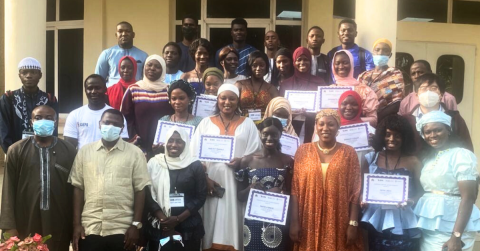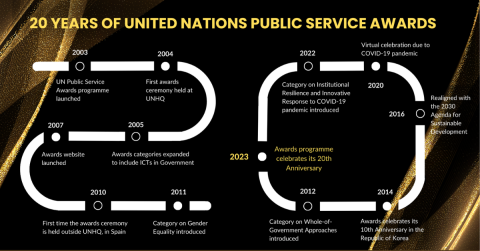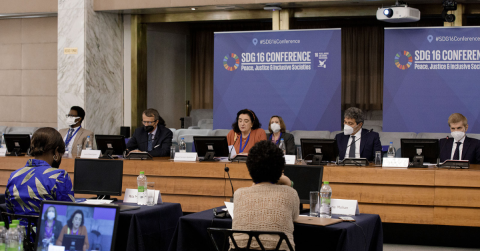Next Global Policy Dialogues aim to turbocharge SDGs under review at HLPF
From the climate crisis to global conflicts to the lingering socioeconomic effects of the pandemic, it is clear that the world is facing major challenges that are setting back hard-earned development progress. It is also clear that we need a revitalization of the Sustainable Development Goals (SDGs) to get us on the best path forward.
Supporting small businesses to achieve inclusive growth for all
Micro-, small and medium-sized enterprises (MSMEs) represent around 90 per cent of global businesses, over 60 per cent of employment and half of the gross domestic product (GDP) worldwide. As such, and in recognition of MSMEs’ contribution to inclusive growth, employment creation, poverty eradication and the empowerment of women, youth and groups in vulnerable situations, the United Nations General Assembly designated 27 June as Micro-, Small, and Medium-sized Enterprises (MSME) Day.
Raising our voices against gender-based violence in older age
Observed on 15 June, World Elder Abuse Awareness Day (WEAAD) was officially recognized by the United Nations General Assembly in 2011. WEAAD represents the one day in the year when the world raises its voice in opposition to elder abuse and enhances the recognition of the dignity of older persons and their right to live their lives free from fear and violence.
Unlocking sustainable development financing through Integrated National Financing Frameworks (INFFs)
As countries worldwide work towards achieving the Sustainable Development Goals (SDGs) by 2030, financing becomes increasingly vital. In 2015, UN Member States adopted the Addis Ababa Action Agenda and agreed to use Integrated National Financing Frameworks (INFFs) to support nationally owned sustainable development strategies.
Celebrating 20 years of public service innovation for sustainable development and inclusion
For two decades, the United Nations Public Service Awards Programme (UNPSA) has celebrated excellence in public service by recognizing the creative achievements and contributions of public institutions to address the social, economic and environmental needs of society. The annual Awards programme which began in 2003 serves as a prominent platform for highlighting global innovations and best practices in public administration and governance.
How standardizing geographical names can make an impact on sustainable development
Wherever we go in the world and whatever we do –whether we’re walking around town, using a ride-sharing app, surfing the Internet, or shopping for groceries – we encounter names of places. These geographical names provide us not only with a sense of place but also with a means of getting around, helping us find information and organize the world we live in.
Engage with UN DESA on LinkedIn
Last month, UN DESA joined millions of online users on LinkedIn, launching its presence on the platform. Home of the Sustainable Development Goals (SDGs), this is the space where our audiences will be able to obtain the latest updates, information and data within the area of economic, social and sustainable development.
“If you want access to the most accurate, up-to-date data and analysis on sustainable development, our new LinkedIn platform is the place to be,” said Lin Yang, Head of the Strategic Planning and Communication Services in UN DESA.
Peace, justice and strong institutions: a beacon of hope amid today’s multiple global challenges
Intersecting global crises are posing unprecedented challenges to advancing the 2030 Agenda for Sustainable Development. The causes and effects of these crises – and the actions needed to address them – are interconnected and deeply rooted in issues of human rights, justice, equity, inclusion, accountability, and good governance. Sustainable Development Goal (SDG) 16: Peace, justice and strong institutions encompasses all these issues and can play a vital role in addressing the key challenges that the world is currently facing.
Mid-year update on the global economic situation foresees more uncertainty as policymakers are facing a complex economic context
As we enter May 2023, the global economic situation remains highly uncertain amid an extraordinary confluence of recent shocks that have affected countries across the world. Inflation has remained stubbornly persistent in many countries, directly impacting the lives of the poor, and posing a significant challenge to central bankers around the world.
A rights-based approach to Indigenous issues
The United Nations will welcome hundreds of Indigenous Peoples from around the world for the 22nd session of the UN Permanent Forum on Indigenous Issues (UNPFII) to be held in New York from 17 to 28 April. They will be discussing the most relevant and pressing issues with members of the Permanent Forum, Member States, and UN entities. Here are some key topics to look out for:
Health of the Planet = Health of Peoples
 Welcome to the United Nations
Welcome to the United Nations









